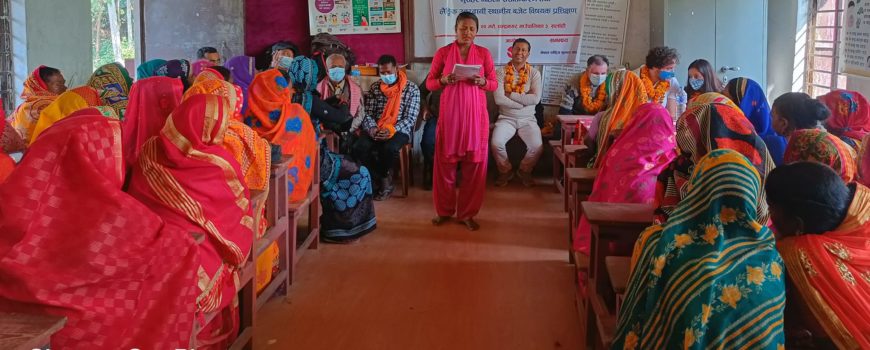
Under the “Strengthening gender-responsive local governance in Nepal” project funded by UNDEF, 15 one-day village level budget demystifying training titled “Mushar women empowerment and gender-responsive local budget” was conducted in four municipalities (Haripur, Barhathwa, Basbariya and Chandranagar) of Sarlahi district of Nepal in different dates from 23 November 2021 to 12 December 2021. The budget demystifying training was conducted with main objective to capacitate 450 Mushar women so as to actively engage them in the budget influencing process for ensuring gender responsive budget practice at local level along with expanding network of Musahar women for strengthened voice. The training enhanced capacity of 483 Musahars from 6 wards of Haripur, 5 wards of Chandranagar, 1 ward of Basbariya and 3 wards of Barhathwa Municipality belonging to 32 different WoMEF groups formed in these four target municipalities.
Budget demystifying training being a Milestone event, UNDEF team (Mr. Alvaro Nieto Martin and Ms. Smriti Pant) along with the project management team (PMT) of SAP Nepal including Narendra Prasad Joshi (Executive Director of SAP Nepal), Janak Karki (Program Coordinator, SAP Nepal), and Rukmani Karki (Admin and Finance Officer) conducted monitoring visit in one of the 15 sites that is Badkarwa of Chandranagar-3 on 6 December 2021 who observed and noted the progress of the program. The monitoring visit was also the visit was very inspiring for the project team to put further efforts in the project for the positive transformation of the Musahar women. During the monitoring visit by the UNDEF team at Chandranagar-3, Narendra Prasad Joshi, Executive Director of SAP Nepal, said that the government, civil society and media should work together for the overall development of the Musahar community. He said that this program would help the Musahar community to access the resources provided by the state by developing the leadership capacity of women and increasing the accountability of the local service provider.

